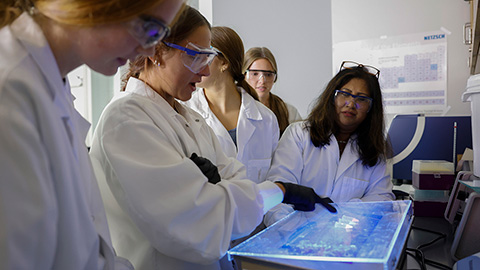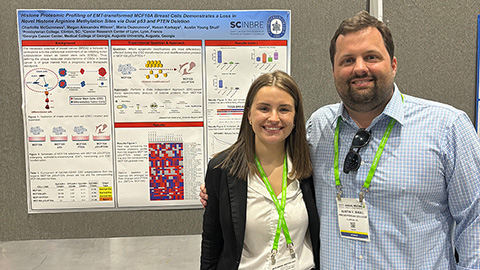I’m fully vaccinated but feel sick – should I get tested for COVID-19?
Imagine last night you developed a little runny nose and a sore throat. When you woke up this morning you started coughing and had a fever. In the past year, your mind would have immediately jumped to COVID-19. But if you are already fully vaccinated, you might wonder: Should I still get tested for COVID-19?

As an infectious disease physician, I am often asked this question. The answer is yes. If you have symptoms of COVID-19, you should get tested for COVID-19 even if you are fully vaccinated. You won’t be at high risk for hospitalization or severe disease, but if you are infected you may pass the virus to an unvaccinated person, who could then get very sick.
Vaccines work but aren’t 100% effective
Researchers have developed some amazing COVID-19 vaccines over the past year. The high efficacy of these vaccines in the closely controlled environment of clinical trials matches their effectiveness in real life. The mRNA vaccines made by Pfizer and Moderna remain over 90% effective in preventing hospitalization or death.
That does not, however, mean that you have the same degree of protection from getting infected.

The latest research estimates that the mRNA vaccines offer 70% to 85% protection from getting infected at all. It’s impossible to know whether a person is fully protected or could still develop a mild case if exposed to the coronavirus.
If you did happen to get infected, you could still spread the virus. And that’s why testing is still important.
What is a breakthrough case?
When a person gets infected with the coronavirus after being fully vaccinated, this is called a breakthrough case. Breakthrough cases demonstrate a basic principle of infectious disease – whether or not a person gets infected depends on the balance between two factors: intensity of exposure and immune competence.
Intensity of exposure relates to how close an uninfected person is to a highly infectious individual spewing virus while talking and how long the two people are in contact. Immune competence relates to the body’s inherent protection against COVID-19. Unvaccinated individuals who’ve never been infected with the coronavirus have no protection – this is a completely new virus after all – while fully vaccinated people will be much more protected.
According to the CDC, as of April 30, 2021, there had been a total of 10,262 known SARS-CoV-2 vaccine breakthrough infections in U.S. states and territories. These are usually asymptomatic or only mildly symptomatic cases, and most don’t result in hospitalization. Breakthrough cases will continue to occur, and though these people are less likely to spread the coronavirus to others than are unvaccinated individuals, they still probably can.

And what about the SARS-CoV-2 variants? Well, the world has been fortunate that the mRNA vaccines in particular afford significant protection against all major variants that have emerged so far. But it is entirely possible that at some point a coronavirus strain could mutate and partially or fully escape the protection from vaccines. This is yet another good reason to get tested if you are feeling sick.
As vaccination rates rise and daily case counts fall in the U.S. and other countries, it is also important to keep a close eye on the coronavirus. COVID-19 testing allows officials to keep track of how much virus is in a community, and positive test results can help people quarantine before unknowingly spreading the virus to others. So, yes, please get tested if you have concerning symptoms, even if you are fully vaccinated.![]()
This article is republished from The Conversation under a Creative Commons license. Read the original article.
Enjoy reading ASBMB Today?
Become a member to receive the print edition four times a year and the digital edition monthly.
Learn moreGet the latest from ASBMB Today
Enter your email address, and we’ll send you a weekly email with recent articles, interviews and more.
Latest in Opinions
Opinions highlights or most popular articles

The tortoise wins: How slowing down saved my Ph.D.
Graduate student Amy Bounds reflects on how slowing down in the lab not only improved her relationship with work but also made her a more productive scientist.

How pediatric cataracts shaped my scientific journey
Undergraduate student Grace Jones shares how she transformed her childhood cataract diagnosis into a scientific purpose. She explores how biochemistry can bring a clearer vision to others, and how personal history can shape discovery.

Debugging my code and teaching with ChatGPT
AI tools like ChatGPT have changed the way an assistant professor teaches and does research. But, he asserts that real growth still comes from struggle, and educators must help students use AI wisely — as scaffolds, not shortcuts.

AI in the lab: The power of smarter questions
An assistant professor discusses AI's evolution from a buzzword to a trusted research partner. It helps streamline reviews, troubleshoot code, save time and spark ideas, but its success relies on combining AI with expertise and critical thinking.

How AlphaFold transformed my classroom into a research lab
A high school science teacher reflects on how AI-integrated technologies help her students ponder realistic research questions with hands-on learning.

Writing with AI turns chaos into clarity
Associate professor shares how generative AI, used as a creative whiteboard, helps scientists refine ideas, structure complexity and sharpen clarity — transforming the messy process of discovery into compelling science writing.

